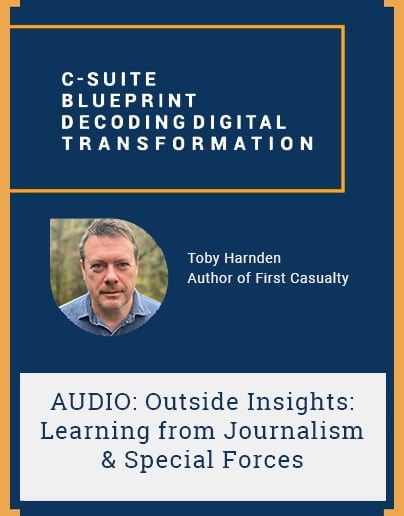C-Suite BluePrint: Decoding Digital Transformation
A good leader knows to look outside their industry for insights and inspiration.
And that’s a whole lot easier when the content is fascinating.
Toby Harnden, the author of First Casualty, has a story that goes beyond fascinating — it’s positively gripping.
Toby joins the show to share insights from the CIA team he profiles in his book and more about how he got the story.
Join us as we discuss:
- The fascinating post-9/11 CIA mission Toby chronicles in the book
- The importance of patience and listening to others share their story the way they want to tell it
- The makeup of a successful team
Let’s delve deeper into this incredible narrative.
“What really struck me and affected me was how different people can be and what different skill sets they can have. Yet, they can still all point in the same direction, they can complement each other, and work towards a common aim.” — Toby Harnden
Career Path
Toby is not your typical journalist. A dual citizen of both the US and the UK, he served in the Royal Navy for almost a decade and has a Master’s in Modern History from Oxford.
Starting off as a theater reviewer and obituary writer, Toby eventually became a correspondent for the Daily Telegraph, a highly respected British paper covering Northern Ireland. He gained critical success in 1999 when his first book, Bandit Country: The IRA & South Armagh, was released. His work is still considered one of the most engaging books about the Irish Troubles.
Down the road, he became Washington Bureau Chief. In the US, he reported on the 9/11 terrorist attacks, which ultimately led him to the Middle East to write about the war in Iraq. He was embedded within a US Army Task Force during the battle of Fallujah.
In 2011, his second non-fiction work Dead Men Risen: The Welsh Guards and the Real Story of Britain's War in Afghanistan, won the Orwell Prize and reached #4 on The Times’ Bestseller List.
His latest book, First Casualty, is about Team Alpha, the first crew of Americans dropped behind enemy lines in response to 9/11. This group of eight contained CIA officers, linguists, and tribal experts, who, at one point, had to ride into the country on horseback with Afghan warlords.
“I think what I've learned to do is listen. And yes, ask questions, but to let it play out — let people talk about what they want to talk about.” — Toby Harnden
Earning trust
From the IRA and the Welsh Guards to US Special Forces and the CIA, Toby has a special gift for gaining the trust of hardened fighters and fully immersing himself in their world.
What’s his secret? Simply letting people talk.
Giving people the time and space to speak freely, especially in high-stress situations, is crucial. Unfailingly polite, Toby is appalled at the casual rudeness of his fellow journalists. They sometimes alienate potential sources instead of building a rapport.
War correspondents in particular have an air of the confessional. Outside the chain of command and willing to listen without judgment, Toby could get down to the more profound human experience that forms the basis of his award-winning stories.
“The people who can say: ‘I think everyone else is maybe wrong on this, I'm going to try something different.’ Those people are going to be the leaders and success stories of the future.” — Toby Harnden
A sense of urgency
In the days after 9/11, top US generals and administration were stunned. There was no plan put in place for such an instance as this.
However, the vastly more nimble CIA organization was determined to handle the problem with speed and quietness, and in the first few months, they were pretty successful. What factors led to that outcome?
Toby says a key ingredient was that Team Alpha consisted of individuals with a vast range of experience. Several members were older than your average soldier, highly creative, and comfortable with taking risks.
Working with a team that compliments your weaknesses and pushes you out of your comfort zone is essential.
The perfect team
It’s worth noting that the CIA’s process of building Team Alpha can apply to the creation of any team. Here are some vital factors to keep in mind.
- A balance of personalities is crucial.
- Experience is precious.
- People with an academic background are agile thinkers.
- Diversity, including age range, and important.
“Getting the right people in the right seats” is more than just an HR maxim; it’s critical to avoiding failure. A willingness to take risks and put a winning team together is no accident. It takes careful planning — and a bit of luck.
The ability to adapt to ever-shifting circumstances is a must-have these days. Toby’s incredible life experiences have given him a unique ability to navigate unfamiliar situations, and his exposure to front-line trials and successes provide valuable lessons that can apply to any setting.
Craving more? You can find this interview and many more by subscribing to C-Suite Blueprint on Apple Podcasts, on Spotify, or here.
